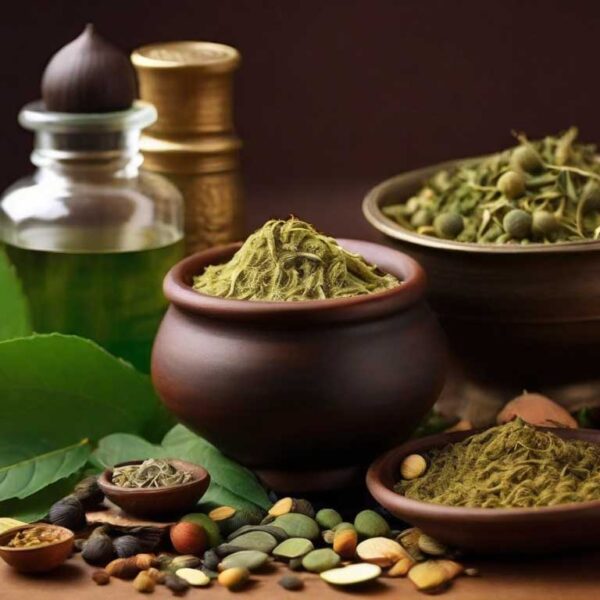
Revitalize Your Tresses: 5 Potent Ayurvedic Remedies for Oily Hair Harmony with Kapha Dosha Brilliance!”
Introduction:
Understanding Kapha dosha serves as a cornerstone in addressing oily hair concerns through Ayurvedic practices. Kapha, characterized by qualities of heaviness, oiliness, and stagnation, plays a significant role in determining hair health. When Kapha dosha becomes imbalanced, it can lead to excess oil production on the scalp, resulting in greasy, flat hair that lacks volume and vitality.
Ayurvedic remedies for oily hair, with its holistic approach to wellness, offers a treasure trove of natural remedies to rebalance Kapha dosha and restore harmony to the scalp and hair. By harnessing the power of herbs, oils, and lifestyle practices, individuals can effectively manage oiliness and rejuvenate their locks from within.
Through Ayurvedic principles, one can address the root cause of oily hair concerns, promoting long-lasting results and overall hair health. By incorporating these natural remedies into their hair care routine, individuals can restore balance and vitality to their hair, achieving a lustrous mane that reflects inner harmony and well-being. With Ayurvedic practices, oily hair becomes a manageable concern, paving the way for hair that radiates health and vitality.
Exploring Kapha Dosha and Its Impact on Hair Health:
Understanding Kapha dosha is essential in comprehending its profound influence on hair health and the development of effective Ayurvedic remedies for oily hair. Kapha, one of the three primary doshas in Ayurveda, embodies qualities of heaviness, oiliness, and stagnation. When Kapha dosha becomes imbalanced, either due to internal or external factors, it can disrupt the natural equilibrium of the scalp and hair follicles, leading to a range of concerns, particularly excessive oiliness and flatness.
The excess Kapha energy manifests on the scalp as an overproduction of sebum, the skin’s natural oil. This excess oiliness can weigh down the hair, making it appear limp, greasy, and lacking volume. Furthermore, the stagnation associated with imbalanced Kapha can impede the flow of vital nutrients to the hair follicles, compromising their health and vitality.
Ayurvedic remedies for oily hair focus on restoring balance to Kapha dosha and promoting healthy hair growth from within. These remedies often involve the use of natural ingredients renowned for their clarifying, purifying, and invigorating properties. Herbs such as neem, amla, and rosemary are known for their ability to cleanse the scalp, regulate sebum production, and stimulate blood circulation, promoting a balanced and rejuvenated scalp environment.
Additionally, Ayurvedic practices such as scalp massages with herbal oils, herbal hair masks, and dietary modifications tailored to pacify Kapha dosha can play a crucial role in managing oily hair concerns effectively. By embracing these holistic approaches, individuals can address the root cause of oily hair imbalances and restore harmony to their scalp and locks, achieving hair that is not only balanced and revitalized but also radiantly healthy and full of life.
Ayurvedic Approach to Managing Oily Hair:
Ayurveda’s approach to managing oily hair embodies a holistic strategy that addresses the root causes of imbalanced Kapha dosha through lifestyle modifications, dietary adjustments, and herbal treatments. Unlike conventional approaches that merely target symptoms, Ayurvedic remedies aim to restore harmony and vitality to both the scalp and hair by fostering overall well-being.
Central to Ayurvedic principles is the recognition that imbalances in Kapha dosha often stem from a combination of factors, including dietary habits, environmental influences, and stress levels. Therefore, adopting a holistic approach involves not only addressing external symptoms but also nurturing internal balance.
Lifestyle adjustments play a crucial role in managing oily hair according to Ayurveda. Practices such as regular exercise, adequate sleep, and stress management techniques help regulate Kapha dosha and promote overall health, thereby indirectly benefiting hair health.
Dietary modifications are also pivotal in rebalancing Kapha dosha and managing oily hair. Ayurveda recommends incorporating light, warming, and pungent foods into the diet to counteract the heavy, oily qualities of Kapha. Additionally, favouring fresh fruits, vegetables, whole grains, and lean proteins over heavy, greasy foods can help maintain a balanced scalp environment and support healthy hair growth.
Furthermore, Ayurvedic herbal treatments offer targeted solutions for oily hair concerns. Herbal remedies such as scalp massages with cooling oils like coconut or neem, herbal hair masks containing ingredients like amla or hibiscus, and herbal hair rinses infused with clarifying herbs like rosemary or sage help cleanse the scalp, regulate sebum production, and promote hair health naturally.
By embracing Ayurvedic principles and incorporating these holistic strategies into their routine, individuals can effectively rebalance Kapha dosha, manage oily hair, and achieve optimal hair health and vitality in the long term. Ayurvedic remedies for oily hair offer a comprehensive and sustainable approach to hair care, fostering not only external beauty but also inner harmony and well-being.
DIY Recipes for Kapha-Pacifying Hair Care:
- Clarifying Herbal Hair Rinse:
• Ingredients: 1/4 cup apple cider vinegar, 1 tablespoon dried rosemary, 1 tablespoon dried mint, 2 cups water.
• Method: Boil water and add rosemary and mint. Let it steep for 30 minutes. Strain the mixture and add apple cider vinegar. After shampooing, pour the herbal rinse over your hair, massaging it into the scalp. Rinse with water. - Refreshing Lemon and Aloe Vera Hair Mask:
• Ingredients: 1/4 cup fresh lemon juice, 1/4 cup aloe vera gel, 1 tablespoon honey.
• Method: Mix all ingredients thoroughly to form a smooth paste. Apply the mask to damp hair, focusing on the scalp and roots. Leave it on for 30 minutes, then rinse with lukewarm water. - Balancing Clay Hair Mask:
• Ingredients: 2 tablespoons bentonite clay, 1 tablespoon neem powder, enough water to form a paste.
• Method: Mix bentonite clay and neem powder, then add water gradually to form a smooth paste. Apply the mask to the scalp and hair, avoiding the ends. Leave it on for 20 minutes, then rinse thoroughly with lukewarm water. - Stimulating Ginger Scalp Treatment:
• Ingredients: 2 tablespoons fresh ginger juice, 2 tablespoons coconut oil.
• Method: Mix ginger juice and coconut oil thoroughly. Massage the mixture into the scalp using circular motions. Leave it on overnight for maximum benefits, then wash your hair in the morning with a mild shampoo. - Nourishing Herbal Hair Oil:
• Ingredients: 1/2 cup sesame oil, a handful of curry leaves, 1 tablespoon fenugreek seeds.
• Method: Heat sesame oil in a pan and add curry leaves and fenugreek seeds. Let them infuse into the oil on low heat for 15-20 minutes. Strain the oil and allow it to cool slightly. Massage the warm herbal oil into the scalp and hair, leave it on for at least an hour, then shampoo as usual.
Incorporating these Ayurvedic remedies for oily hair DIY remedies into your hair care routine can effectively manage oily hair and promote scalp health, leaving your locks feeling refreshed, balanced, and revitalized.
Incorporating Ayurvedic Hair Care into Daily Routine:
Incorporating Ayurvedic remedies for oily hair care practices into your daily routine can yield numerous benefits, especially when addressing oily hair concerns through Ayurvedic remedies. By embracing these holistic approaches, you not only manage oiliness effectively but also promote overall scalp health and balance.
Regular scalp massages with Ayurvedic herbal oils stimulate blood circulation, nourish hair follicles, and promote relaxation. This practice helps regulate sebum production, reducing excessive oiliness while imparting strength and vitality to the hair strands. Incorporating the clarifying herbal hair rinse and balancing clay hair mask into your routine further aids in removing excess oil and impurities from the scalp, leaving it refreshed and balanced.
Using herbal shampoos instead of commercial ones laden with harsh chemicals ensures gentle cleansing without stripping away the scalp’s natural oils. Herbal ingredients like neem, rosemary, and mint in these shampoos possess antimicrobial properties that help combat scalp infections and maintain a healthy scalp environment. The refreshing lemon and aloe vera hair mask provides additional nourishment to the hair and scalp, promoting hydration and balance.
Staying hydrated is crucial for maintaining overall health, including scalp health. Consuming a Kapha-balancing diet rich in light, warming foods helps regulate Kapha dosha and supports optimal hair health. Additionally, the stimulating ginger scalp treatment and nourishing herbal hair oil provide deep nourishment to the scalp and hair, promoting circulation, strengthening the roots, and reducing oiliness.
Incorporating these Ayurvedic remedies for oily hair into your daily routine not only addresses the symptoms but also addresses the root cause of excess oil production. By embracing Ayurvedic principles and practices, you can achieve balanced, vibrant hair that reflects inner health and vitality.Top of Form
Conclusion:
In conclusion, integrating Ayurvedic remedies for oily hair into your daily regimen offers a natural and holistic approach to managing excess oiliness and promoting overall hair health. By embracing Ayurvedic principles, such as regular scalp massages, herbal shampoos, hydration, and a Kapha-balancing diet, you can restore balance to the scalp and hair follicles. These DIY remedies, enriched with Ayurvedic herbs and ingredients, provide gentle yet effective solutions to address oily hair concerns from the root. Embracing Ayurveda’s wisdom not only helps manage oiliness associated with Kapha dosha but also fosters long-term health and vitality for your hair, ensuring it remains healthy, balanced, and radiant naturally.



